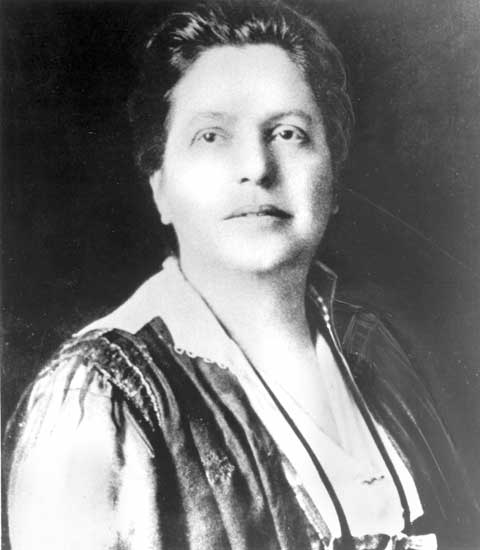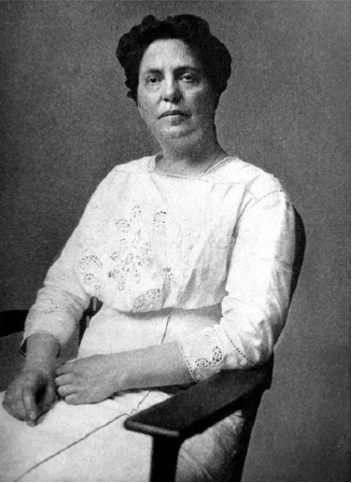

Partner Mabel Hyde Kittredge, Helen Arthur
Queer Places:
Henry Street Settlement, 265 Henry St, New York, NY 10002, Stati Uniti
House on the Pond, 4 Round Pond Rd, Westport, CT 06880
Mount Hope Cemetery, 1133 Mt Hope Ave, Rochester, NY 14620, Stati Uniti
 Lillian
D. Wald (March 10, 1867 – September 1, 1940) was an American nurse,
humanitarian and author. she corresponded with
Emma Goldman
and Goldman met her at the Henry Street settlement house, where Goldman’s friend, Emma Lee, worked. Goldman noted, “They were genuinely concerned with the people of the East Side”.
Goldman corresponded with Wald in Jefferson City Prison. A special friend of
Lillian Wald in the early years of Henry
Street was Mabel Hyde Kittredge, a
Park Avenue socialite and the most famous home economist of her day. Lillian
Wald’s correspondence with Mabel Kittredge is ‘replete with passages of ardor
and longing’. Kittredge
wrote books on household management with gripping titles such as Housekeeping
notes: How to furnish and keep house in a tenement flat (1911), and was a
crusader for school lunches, which fitted well with the public health side of
Henry Street’s work: a hot lunch programme was set up in New York City public
schools in 1901, and was finally funded by the Board of Education in 1920. A
feminist and pacifist, Kittredge represented the Henry Street Settlement at
The Hague Congress in 1915, and she was a source of important financial
support, living in the Settlement for some years in the early 1900s. She
appears to have been somewhat needy in her relationship with Wald. Her
successor in Wald’s affections, a lawyer called
Helen Arthur, was also very
generous, and a key support for another of Wald’s ventures, The Neighborhood
Playhouse, one of the first community theatres.
Lillian
D. Wald (March 10, 1867 – September 1, 1940) was an American nurse,
humanitarian and author. she corresponded with
Emma Goldman
and Goldman met her at the Henry Street settlement house, where Goldman’s friend, Emma Lee, worked. Goldman noted, “They were genuinely concerned with the people of the East Side”.
Goldman corresponded with Wald in Jefferson City Prison. A special friend of
Lillian Wald in the early years of Henry
Street was Mabel Hyde Kittredge, a
Park Avenue socialite and the most famous home economist of her day. Lillian
Wald’s correspondence with Mabel Kittredge is ‘replete with passages of ardor
and longing’. Kittredge
wrote books on household management with gripping titles such as Housekeeping
notes: How to furnish and keep house in a tenement flat (1911), and was a
crusader for school lunches, which fitted well with the public health side of
Henry Street’s work: a hot lunch programme was set up in New York City public
schools in 1901, and was finally funded by the Board of Education in 1920. A
feminist and pacifist, Kittredge represented the Henry Street Settlement at
The Hague Congress in 1915, and she was a source of important financial
support, living in the Settlement for some years in the early 1900s. She
appears to have been somewhat needy in her relationship with Wald. Her
successor in Wald’s affections, a lawyer called
Helen Arthur, was also very
generous, and a key support for another of Wald’s ventures, The Neighborhood
Playhouse, one of the first community theatres.
Wald was known for contributions to human rights and was the founder of American community nursing.[1] She founded the Henry Street Settlement in New York City and was an early advocate to have nurses in public schools.
After growing up in Ohio and New York, Wald became a nurse. She briefly attended medical school and began to teach community health classes. After founding the Henry Street Settlement, she became an activist for the rights of women and minorities. She campaigned for suffrage and was a supporter of racial integration. She was involved in the founding of the National Association for the Advancement of Colored People (NAACP).

Wald never married. She maintained her closest relationships and attachments with women. Correspondence reveals that Wald felt intimate affection for at least two of her companions, homemaking author Mabel Hyde Kittredge and lawyer Helen Arthur. Ultimately, however, Wald was more engaged in her work with Henry Street than in any intimate relationship. In regard to Wald's relationships, author Clare Coss writes that Wald "remained in the end forever elusive. She preferred personal independence, which allowed her to move quickly, travel freely and act boldly."[11] Wald's personal life and focus on independence was clear in her devotion to the Settlement and improving public health.
She died of a cerebral hemorrhage on September 1, 1940. A rabbi conducted a memorial service at Henry Street's Neighborhood Playhouse. A private service was also held at Wald's home. A few months later at Carnegie Hall, over 2,000 people gathered at a tribute to Wald that included messages delivered by the president, governor and mayor.[3] She was interred at Mount Hope Cemetery in Rochester.[12]
My published books: